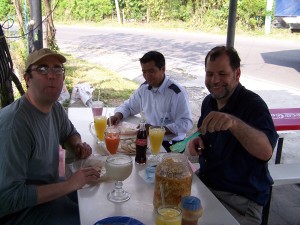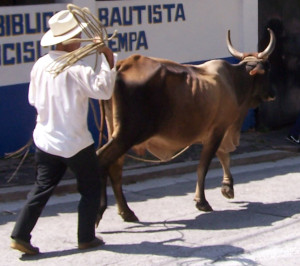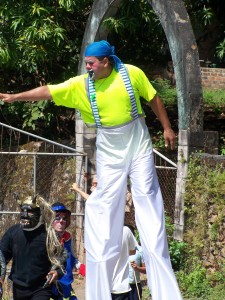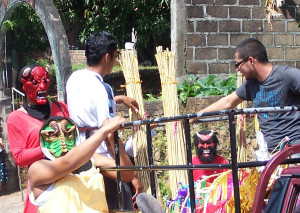Category: The Arts
A theory of optimal tattoos
David Stearns, a loyal MR reader, asks:
How would you pick a tattoo, if you decided you were going to get one? How would you pick something that your future self is most likely to be glad to have? A favorite piece of art? Follow Leeson's lead and get an economics-related tattoo? Names of family members are off-limits, as are answers like "get a small dot in my armpit that nobody would see."
I would pick a country which I loved visiting, such as Mexico or Brazil, both of which have distinct shapes. It would be an excuse to narrate previous visits and I don't think it would repulse many people, other than the fact that it is a tattoo. An artwork in tattoo form would look low-brow. A Celtic geometric design would be another option. The obvious alternative would be to pick something which looked criminal, but I don't think that would mesh well with my other strategies in life. For some men it would pay off.
Here is Dan Ariely on tattoos.
Richard T. Gill
Richard T. Gill, in all statistical probability the only Harvard economist to sing 86 performances with the Metropolitan Opera, died on Monday…He was 82.
The article is here. Gill wrote many widely used texts and oddly he did not begin vocal training until he was almost forty. Up until that point, he had little acquaintance with classical music and he smoked two and a half packs of cigarettes a day. He first performed in a staging of Figaro at Harvard, directed by John Lithgow and conducted by John Adams (the John Adams). Later, he was in the world premiere of Philip Glass's Satyagraha. Gill continued to write and edit textbooks throughout his singing career.
In 1971 he gave up his tenure at Harvard. In 1984-85 he hosted a 28-part PBS show on economics. In the 1990s he wrote two books, one on population the other on the decline of the American family. Here is Gill's proposal for a Parental Bill of Rights. His short stories for Atlantic Monthly and The New Yorker were widely anthologized and in 2003 he published his first novel.
Here is his home page. At the time of his death he was working on a three to four-volume autobiography. As a Harvard undergraduate he was a successful boxer and somehow he ended up as an Assistant Dean at Harvard by age 21 and later Master of Leverett House.
Adventures in El Salvador
Tyler, Garett Jones and I visited El Salvador for a few days, just for fun. Here is a travelogue of some of our adventures.
The moment we exit customs Tyler grabs a driver and starts speaking in rapid Spanish. Neither Garett nor I are fluent but we are laughing because we know exactly what  Tyler is saying. Tyler wants pupusas and not pupasas turÃsticos but estilo familiar. The driver understands as well so we jump into his van and he brings us to a pueblo with about 8 or 9 pupuserÃas in direct competition–we learn later that this is the town speciality. We get Pupusas de chicharrones, queso and lorocco, a herb that is hard to find in the United States. Bien Gusto. Tyler is sated so we continue on to Suchitoto, the small colonial town that will be our base of operations.
Tyler is saying. Tyler wants pupusas and not pupasas turÃsticos but estilo familiar. The driver understands as well so we jump into his van and he brings us to a pueblo with about 8 or 9 pupuserÃas in direct competition–we learn later that this is the town speciality. We get Pupusas de chicharrones, queso and lorocco, a herb that is hard to find in the United States. Bien Gusto. Tyler is sated so we continue on to Suchitoto, the small colonial town that will be our base of operations.
The next day we take a boat tour of Lake Suchitlan, an artificial lake nestled among hills and volcanoes. We ask our guide  to take us to a local village–it’s an unusual request but we are the only tourists in town so why not.
to take us to a local village–it’s an unusual request but we are the only tourists in town so why not.
We climb a long hill, it’s blazing hot but we have a look around, get a drink and having seen all there is to see start to head back down to the boat. That’s when we hear the sirens and gunshots–other people hear it as well and stop walking. Only now do I remember the advice from Apocalypse Now, “Never get out of the boat!”
Tyler asks the guide what is going on. He isn’t sure either but he asks a local and tells Tyler it’s “the running.” Tyler is puzzled and looks as confused as I am–this is not a good sign–the word has many meanings, it could be the running of the bulls, the running of the race, the running? Well it seems not to be gunshots so I joke to Tyler that it would be awesome if it were the running of the bulls.
Not 15 seconds later I turn around and I am confronted with an angry bull bearing down on me. It looks like this:

Tyler, Garett and I jump out of the way. What the hell is going on?! With a second or two to recover, I realize the bull is being driven by a gaucho. The bull is snorting and none too happy, the sirens and shots are making it skittish, but the guacho slaps it hard, gets it under control and then, as if in a dream, the gaucho and bull vanish around the corner. We breathe a sigh of relief.

The running of the bull–as Tyler, Garett and I have coined the event–however, was not the running.
It was at about this time that things started to get a little surreal.
 The sirens are approaching, the “gunshots” are getting louder and we see a strangely dressed man coming up the hill towards us. He appears to be tall, very tall, wait…am I in a Fellini movie?
The sirens are approaching, the “gunshots” are getting louder and we see a strangely dressed man coming up the hill towards us. He appears to be tall, very tall, wait…am I in a Fellini movie?
The man is on stilts and is accompanied by a coterie of devils.
As the group passes, we are handed a handsome annual report with pictures of the mayor and the year’s accomplishments. Ah, this is fiscal policy! Now we understand.
We head back to the boat, pleased with our luck and well satisfied with the day’s events. 
Addendum: If you go here are few practical things to bear in mind. El Salvador is not geared towards tourists–this has positive and negative aspects. On the positive side you can believe the prices you are quoted, there is not yet a “take the tourist for all they are worth” culture. On the negative side, there isn’t much to buy. There aren’t many indigenous people and, in part because there isn’t a tourist market, there isn’t a strong artisinal culture, as there is in say Guatemala. There are a few Mayan ruins but nothing as extensive as in Guatemala or Mexico. Few people speak English, even at hotels and restaurants. The pupasas are great but the food variety is limited. We were perfectly happy exploring for two days but this is one of the less exotic countries of Central America.
(By the way, do you see the devil at right, so oddly framed between the bars of the truck. Why is he looking at me this way?)
 We stayed in Suchitoto at a small (6-8 room) hotel called Los Almendros de San Lorenzo. It’s run by a former El Savadorean diplomat who lived 30 years abroad and his partner, an interior decorator. Highly luxurious and recommended but anomalous, don’t take this as representing Suchitoto.
We stayed in Suchitoto at a small (6-8 room) hotel called Los Almendros de San Lorenzo. It’s run by a former El Savadorean diplomat who lived 30 years abroad and his partner, an interior decorator. Highly luxurious and recommended but anomalous, don’t take this as representing Suchitoto.
El Salvador has a very high murder rate, more than 10 times the US rate. Suchitoto, however, is safe and San Salvador seems fine for walking around in the main sections although every shop with anything of value has a guy with a shotgun standing outside.
On the way back from the village after the boat ride we were going to take the bus back into town. We asked some locales where the bus stop was and they volunteered to give us a ride in the back of their truck. Here’s a nice photo of Tyler (taken by Garett) as we traveled the bumpy road back into town. I believe we discussed Mundell and optimum currency areas.

Words of wisdom
The best advice about how to conduct yourself at work is to know yourself, and get new information–from outside your own experience–about what is possible in the world. And that is what fiction, and plays, and poetry, and this blog, are about.
More here. I thank Alex and Garett for having done a short (very short) jaunt to El Salvador with me; more on that soon.
Mario Vargas Llosa wins Nobel Prize
That's for literature, sadly he never had the chance to win a prize for economics, as his political career as a Peruvian classical liberal was cut short by electoral defeat. He has many fine books but I have two particular favorites: The War of the End of the World (serious and epic, concerning a millenarian revolt in Brazil) and Aunt Julia and the Scriptwriter (a fun story and spoof of telenovela culture). Conversation in the Cathedral is sometimes considered a classic but I find it unreadable. I suspect his early The Green House will resonate more with Latin Americans. His last major novel, The Bad Girl, was entertaining but not entirely satisfying and it reminded me a bit too much of an older man writing about sex. The Feast of the Goat is a very good study of political power. Here are previous MR mentions of Mario Vargas Llosa.
Here is Wikipedia on Vargas Llosa. Alex has done a good bit of work with Alvaro Vargas Llosa, son of Mario and a prominent writer on classical liberal themes, and perhaps he will relate some of that to us.
Are there advantages to prosopagnosia?
The artist Chuck Close, who is famous for his gigantic portraits of faces, has severe, lifelong prosopagnosia. He believes it has played a crucial role in driving his unique artistic vision. "I don't know who anyone is and essentially have no memory at all for people in real space," he says. "But when I flatten them out in a photograph I can commit that image to memory."
That is from a recent NY article by Oliver Sacks, not on-line but gated here. Sacks himself has this condition, as did Jane Goodall, including when she worked with chimpanzees.
Are cruise ships saving the theatre industry?
Cruise entertainment doesn't have the best of reputations, but I took my maiden voyage earlier this year and it was a real eye-opener. I was there to review shows on board the Celebrity Eclipse, and both the productions and facilities were extremely impressive. The theatre itself was actually of a far higher standard than many of the West End's crumbling playhouses – more comfy seats, better sightlines, excellent acoustics and high-end equipment.
Celebrity spends up to $1m per show for three 60-minute productions on every ship in its line. Each vessel has a 1,150-seat theatre, employs a cast of 18, plus nearly 40 musicians, a stage crew of six and various other technical crew across the music lounges on the ship.
And cruising is a huge growth area in the entertainment business. Looking across some of the other lines – P&O has its own on-board theatre company with more than 100 entertainers, Royal Caribbean is staging cruise versions of Hairspray and Chicago, and elsewhere there are licensed versions of Andrew Lloyd Webber musicals or other popular shows such as Saturday Night Fever.
But no Chekhov. The full story is here.
What is emblematic of the 21st century?
A recent reader request was:
What things that are around today are most distinctively 21st century? What will be the answer to this question in 10 years?
Here is what comes to mind and I think most of it will remain emblematic for some time:
Technology: iPhone, Wii, iPad, Kindle. These are no-brainers and I do think it will go down in American history as "iPhone," not "iPhone and other smart phones." Sorry people.
To read: blogs and Freakonomics, this is the age of non-fiction. I don't think we have an emblematic and culturally central novel for the last ten years. The Twilight series is a possible pick but I don't think they will last in our collective memory. Harry Potter (the series started 1997) seems to belong too much to the 1990s.
Films: Avatar, Inception (for appropriately negative reviews of the latter, see here, here, and here). Both will look and feel "of this time." Overall there have been too many "spin-off" movies. Keep in mind this question is not about "what is best."
Music: It's been a slow period, but I'll pick Lady Gaga, most of all for reflecting the YouTube era rather than for her music per se. I don't think many musical performers from the last ten years will become canonical, even though the number of "good songs" is quite high. Career lifecycles seem to be getting shorter, for one thing.
Television: The Sopranos starts in 1999, so it comes closer to counting than Harry Potter does. It reflects "the HBO era." Lost was a major network show and at the very least people will laugh at it, maybe admire it too. Battlestar Galactica. Reality TV.
What am I missing? What does this all add up to? Pretty strange, no?
p.s. Need to add Facebook and Google somewhere!
Sentences to ponder
Gabriel Josipovici, a research professor at the University of Sussex, is disenchanted with the absence of disenchantment with the world.
Why do we like adventure stories with guides?
Robin Hanson asks:
I’ve been sick, so watched tv more than usual. Watching Journey to the Center of the Earth, I noticed yet again how folks seem to like adventure stories and games to come with guides. People prefer main characters to follow a trail of clues via a map or book written by someone who has passed before, or at least to follow the advice of a wise old person.
Dante of course provides another example, as does Sibyl and Aeneas. And Robin's conclusion?:
This has a big lesson for those who like to think of their real life as a grand adventure: relative to fiction, real grand adventures tend to have fewer guides, and more randomness in success. Real adventurers must accept huge throws of the dice; even if you do most everything right, most likely some other lucky punk will get most of the praise.
If you want life paths that quickly and reliably reveal your skills, like leveling up in video games, you want artificial worlds like schools, sporting leagues, and corporate fast tracks. You might call such lives adventures, but really they pretty much the opposite. If you insist instead on adventuring for real, achieving things of real and large consequence against great real obstacles, well then learn to see the glorious nobility of those who try well yet fail.
Markets in Everything: A Puzzle
Very good sentences
A German student created a major traffic jam in Bavaria after making a rude gesture at a group of Hell's Angels motorcycle gang members, hurling a puppy at them and then escaping on a stolen bulldozer.
The story is here and Felix Salmon also cited this. We are informed that:
The puppy was now in safe hands…
My favorite things Berlin
1. Movie, set in: One, Two, Three captures a bit of comedy from the Cold War and shows Jimmy Cagney to be a surprisingly versatile actor. Wings of Desire has stunning moments, most of all in the Staatsbibliothek with the angels and in the indie music club. Goodbye, Lenin! shows German movies can be funny, as does Run, Lola, Run!. I don't like films about either the rise or fall of the Nazis and I couldn't get through Berlin Alexanderplatz.
2. Essayist: Kurt Tucholsky. He is hardly read by Americans, and perhaps does not translate well, but is arguably one of the most eloquent and also funniest essayists of his century. Heinreich Heine also spent time in the city, although he is not a "Berliner" in the same way.
3. Painter: George Grosz and Otto Dix have lost their shock value. I'll pick Lucien Freud, who was born in Berlin, though he ended up in England. Käthe Kollwitz deserves consideration, as well as for sculptor.
4. Symphonic performance: Furtwängler's 1942 performance of Beethoven's 9th, recorded live. Has to be heard to be believed. Obviously there was a lot at stake and furthermore Hitler was in the audience. This performance will terrify you.
5. Sociologist: Georg Simmel, especially his book on the philosophy of money.
6. Political philosopher: Wilhelm von Humboldt, The Limits of State Action, which to this day remains one of the best statements of libertarian political philosophy.
7. Playwright: Lessing's Nathan the Wise is a beautiful plea for tolerance. Bertolt Brecht was a compelling writer despite his communist politics.
8. Architect: Walter Gropius or Erich Mendelsohn.
9. Philosopher: Schopenhauer and Hegel both taught in Berlin. Even Hegel, while he is full of gobbledy-gook, is brilliant on a frequent basis. Don't start with Phenomenology of Spirit. At the very least, read Schopenhauer's aphorisms.
10. Film director: Ernst Lubitsch was born there, and filmed silents there, though he later had to leave. His Trouble in Paradise (1932) is today an under-viewed movie, plus his later romantic features, such as The Shop Around the Corner, Heaven Can Wait, and To Be Or Not To Be, all merit attention.
11. Non-fiction book, about: Two that come to mind are Richard Grunberger's The 12-Year Reich and Anthony Beevor's The Fall of Berlin 1945. I do like books about the rise and fall of the Nazis; I just don't think the topic lends itself well to film.
12. Novel, set in: Uwe Johnson, The Third Book About Achim [Das dritte Buch über Achim] and John le Carré, The Spy Who Came in From the Cold.
13. Poet: Rilke.
Kurt Weill belongs somewhere, as does Christopher Isherwood, Gustav Grundgens, or for that matter E.T.A. Hoffmann. In popular music there is Ricardo Villalobos (born in Chile, but a Berliner), Einstürzende Neubauten (start with Halber Mensch), and Peter and also Casper Brötzmann. I confess that most Mendelssohn bores me.
The bottom line: How many countries could beat this line-up? And most of it comes in a relatively short period of time.
Capitalism: Hollywood’s Miscast Villain
In the WSJ online I cover Hollywood and capitalism including Star Wars, Star Trek, Avatar, The Wire and much else. Here are two bits:
Although Hollywood does sometimes produce leftist films like "Reds," it has no deep love for socialism…
But Hollywood does share Marx's concept of alienation, the idea that under capitalism workers are separated from the product of their work and made to feel like cogs in a machine rather than independent creators. The lowly screenwriter is a perfect illustration of what Marx had in mind–a screenwriter can pour heart and soul into a screenplay only to see it rewritten, optioned, revised, reworked, rewritten again and hacked, hacked and hacked by a succession of directors, producers and, worst of all, studio executives. A screenwriter can have a nominally successfully career in Hollywood without ever seeing one of his works brought to the screen. Thus, the antipathy of filmmakers to capitalism is less ideological than it is experiential. Screenwriters and directors find themselves in a daily battle between art and commerce, and they come to see their battle against "the suits" as emblematic of a larger war between creative labor and capital.
On The Wire:
…although it uses character, "The Wire" is ultimately about how character is dominated by larger economic forces: drug dealers come and go, but the drug market is forever. "Capitalism is the ultimate god in The Wire. Capitalism is Zeus," says David Simon, the show's creator.
Over its five seasons, "The Wire" shows how money and markets connect and intertwine white and black, rich and poor, criminal and police in a grand web that none of them truly comprehends–a product of human action but not of human design. It's the invisible hand that's calling the shots, as Mr. Simon subtly reminds us in the conclusion to the third season, when Detective McNulty wondrously pulls a book from the shelf of murdered drug dealer Stringer Bell, and the camera focuses in on the title: "The Wealth of Nations" by Adam Smith.
Smith's metaphor of the invisible hand, like Mr. Simon's invocation of Zeus, tells us that to understand the world we need to look beyond the actions of individuals to see the larger forces at work. But Zeus is an arbitrary and capricious god whose lightning bolts fall out of the sky without reason or direction. Smith's "invisible hand," however, is that of a kinder god, a god that cares not one whit for individuals but nevertheless guides self-interest toward the social good, progress, and economic growth. So Mr. Simon understands that the Baltimore dockworkers lost their jobs because of the relentless change that capitalism brings and not through any fault of their own. But Adam Smith sees what Mr. Simon does not, namely that it was capitalism that brought the Baltimore stevedores their high wages in the first place and it is the relentless change of capitalism that slowly raises wages throughout the world.
More here.
My favorite things Turkey
1. Novelist: Orhan Pamuk. My favorite books by Pamuk are the ones rooted most firmly in Istanbul and Turkey, namely The Museum of Innocence and Istanbul and also Snow. Those are some of my very favorite books, period.
2. Non-fiction book, set in: There is Runciman and Kinross and Stephen Kinzer. Is the Osman book good?
3. Movie, set in: From Russia With Love and Topkapi come to mind; my knowledge of Turkish cinema is weak.
4. Opera, set in: The Abduction from the Seraglio, maybe the Beecham recording, or Krips, plus I like the overture of the Harnoncourt version, much more Turkish-sounding than the others. And I don't have to tell you my favorite Rondo.
Uh-oh, suddenly there is too much Orientalism in this post. Reverse course!
5. Favorite recording showing the unities behind Turkish and classical music: Istanbul, Dimitrie Cantemir, by Jordi Savall. Quite the revelation and it makes you wonder how well we understand the true story of classical music.
6. Singer: Tarkan comes to mind and he is well represented on YouTube. There is an entire strand of Turkish popular song, in the direction of Sezen Aksu, YouTube here. But overall my pick is Edip Akbayram, imagine a Turkish version of Tropicalia.
7. Economist: Dani Rodrik, Daron Acemoglu, Timur Kuran, and Faruk Gul are the best-known Turkish economists I can think of. I believe Nouriel Roubini was born in Turkey but I don't think he counts as Turkish.
8. Music mogul: Ahmet Ertegun, founder of Atlantic Records.
9. Classical pianist: I still have mixed feelings about Fazil Say, who is very subjective with the score. Idil Biret has some good recordings of romantic music and piano transcriptions.
10. Cynic: Diogenes, who in a few ways was an early version of Robin Hanson, though I am not suggesting Robin is a cynic in the lower case sense.
The bottom line: Textiles and the decorative arts weigh in as strong additional positives, but I wish there were more Turkish writers I liked.